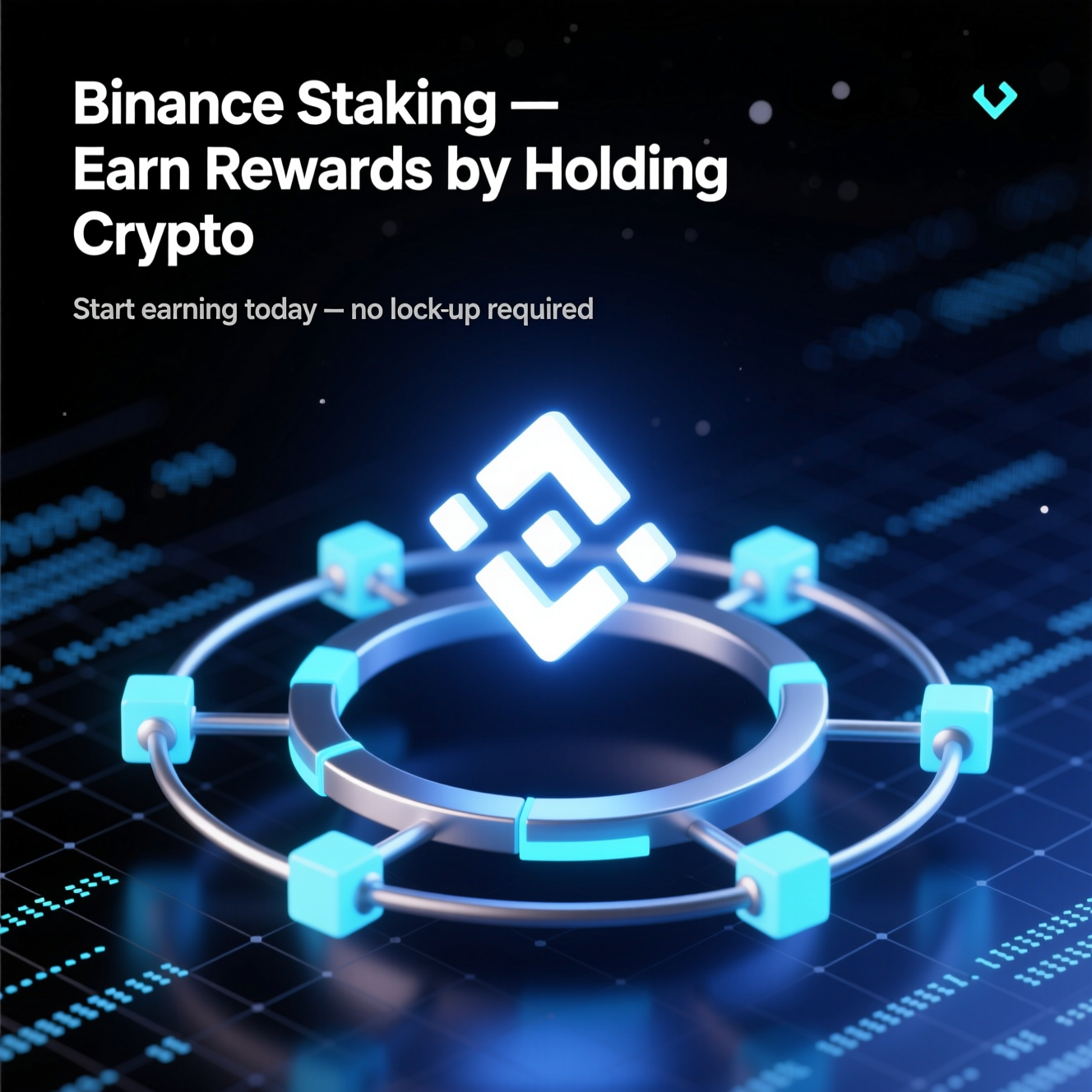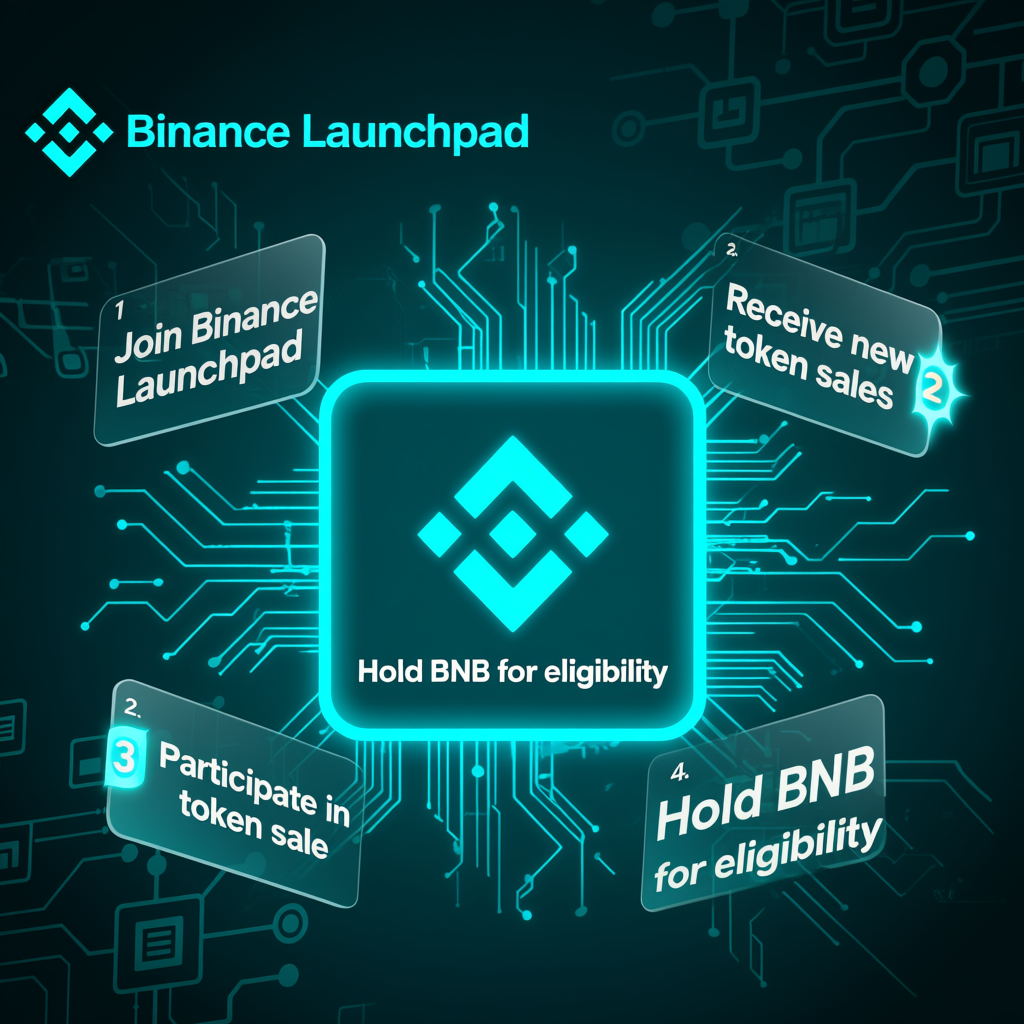If you hold cryptocurrency for the long term, you can make your assets work for you through staking — one of the most popular and low-risk ways to earn passive income in the crypto world.
“`htmlBinance Staking allows users to earn rewards just by holding supported cryptocurrencies on the platform. You don’t need to run a node or worry about technical setups — Binance takes care of everything while you enjoy steady returns.
This guide will explain what staking is, how Binance Staking works, and how you can start earning rewards safely and effectively.
What Is Crypto Staking?
Staking is the process of locking your crypto to support a blockchain network’s security and operations — in exchange, you earn rewards.
It’s part of the Proof-of-Stake (PoS) system, used by many blockchains like Ethereum, Cardano, Solana, and Polygon.
In simple terms:
“You earn more coins by holding your coins.”
When you stake, your tokens help validate transactions on the network. The more tokens staked, the higher your potential rewards.
How Binance Staking Works
Binance offers two main types of staking:
- Locked Staking – You lock your crypto for a set time (e.g., 30, 60, or 90 days) to earn higher rewards.
- Flexible Staking – You earn rewards while keeping the ability to withdraw your funds anytime.
Binance handles all the technical parts — running validator nodes, maintaining uptime, and distributing staking rewards.
You simply:
- Choose a coin
- Select a duration
- Stake your tokens
- Earn rewards daily
How to Start Staking on Binance (Step-by-Step)
Step 1: Log in to Your Binance Account
Go to binance.com or use the mobile app. If you don’t have an account, create one and complete KYC verification.
Step 2: Go to Binance Earn
Click on Earn → Staking or visit the Simple Earn section (Binance recently merged staking into Simple Earn).
Step 3: Choose a Coin to Stake
Popular staking coins include:
- BNB (Binance Coin)
- ADA (Cardano)
- SOL (Solana)
- DOT (Polkadot)
- MATIC (Polygon)
- ETH (Ethereum 2.0 staking)
Each coin shows its annual percentage yield (APY) and available durations.
Step 4: Select Duration and Amount
Choose between:
- Locked (higher APY)
- Flexible (lower APY, can withdraw anytime)
Enter the amount you want to stake and click Confirm.
Step 5: Earn and Track Rewards
Your staking starts instantly. You’ll see:
- Daily rewards in your wallet
- Estimated total returns
- Unlock date (for locked staking)
Example of Staking Returns
| Coin | Type | Duration | Estimated APY | Example Return |
|---|---|---|---|---|
| BNB | Locked | 90 Days | 7% | 1 BNB earns 0.0175 BNB |
| ADA | Flexible | — | 4% | 100 ADA earns 4 ADA/year |
| DOT | Locked | 60 Days | 12% | 10 DOT earns 1.2 DOT |
| MATIC | Locked | 120 Days | 10% | 1000 MATIC earns 100 MATIC |
(Actual APY varies with network performance and demand.)
Benefits of Binance Staking
✅ 1. Hassle-Free Setup
No need for technical knowledge, validator nodes, or minimum staking amounts — Binance manages everything.
✅ 2. Wide Range of Supported Coins
Stake dozens of PoS tokens like ETH, ADA, BNB, SOL, and more.
✅ 3. Flexible or Locked Options
Choose what fits your strategy — short-term flexibility or long-term higher returns.
✅ 4. Daily Reward Distribution
Earnings are distributed daily, and you can track them in real time.
✅ 5. High Security
Binance uses institutional-grade security with cold storage and insurance protection.
Flexible vs Locked Staking — Key Differences
| Feature | Flexible Staking | Locked Staking |
|---|---|---|
| Withdrawal | Anytime | Locked for fixed duration |
| APY | Lower (2–6%) | Higher (6–20%) |
| Ideal For | Beginners, short-term holders | Long-term investors |
| Risk | Very low | Slightly higher (locked funds) |
Risks of Staking on Binance
Even though staking is relatively safe, you should be aware of:
- Lock-in Period Risk: You can’t access funds during a locked term.
- Market Volatility: If coin prices drop, your reward value may decrease.
- Network Risks: Validator or protocol issues can affect payouts.
- APY Fluctuations: Returns vary with network conditions.
Pro Tip:
To reduce risk, stake stable tokens or diversify across multiple coins.
ETH 2.0 Staking on Binance
Ethereum switched from Proof-of-Work (PoW) to Proof-of-Stake (PoS), allowing users to earn yield by staking ETH.
On Binance:
- You can stake ETH with no minimum (even 0.01 ETH).
- Binance gives you BETH (a token representing your staked ETH).
- You can trade or hold BETH to earn daily staking rewards.
When withdrawals are enabled on-chain, Binance automatically converts your BETH back to ETH.
APY: Around 3%–5%, depending on network performance.
BNB Staking via BNB Vault
BNB Vault combines multiple earning programs — Launchpool, Simple Earn, and DeFi staking — to maximize your BNB rewards.
Benefits:
- Auto-compounded returns
- Multi-source rewards
- Flexible redemption
You can earn up to 10% APY by staking your BNB through the Vault.
DeFi Staking on Binance
DeFi Staking lets you access Decentralized Finance (DeFi) projects without leaving Binance. Binance handles technical and security aspects while you earn DeFi-level rewards.
Examples of supported protocols:
- PancakeSwap (CAKE)
- AAVE
- Curve Finance (CRV)
Typical APY: 10–50%, depending on the project.
Tips for Successful Staking on Binance
- Check Lock-in Dates Carefully: Withdrawals before the end date may forfeit rewards.
- Compare APYs Across Coins: Some coins offer much higher yields.
- Diversify: Stake multiple assets to balance returns.
- Reinvest Rewards: Compound your earnings for exponential growth.
- Watch Market Trends: Consider token value, not just APY.
Future of Staking on Binance
Binance continues to improve staking services by:
- Adding more supported blockchains
- Integrating auto-compounding options
- Supporting ETH restaking and cross-chain yield aggregation
- Building DeFi integration directly into Binance Earn
With these innovations, Binance aims to make staking even more accessible and rewarding for both retail and institutional users.



Leave a Reply